I'm following an example code from Programming Principles and Practice Using C++ in one of the example for exception it shows this snippet of code
int main()
{
try {
vector<int> v; // a vector of ints
for (int x; cin >> x; )
v.push_back(x); // set values
for (int i = 0; i <= v.size(); ++i) // print values
cout << "v[" << i << "] == " << v[i] << '\n';
}
catch (const out_of_range& e) {
cerr << "Oops! Range error\n";
return 1;
}
catch (...) { // catch all other exceptions
cerr << "Exception: something went wrong\n";
return 2;
}
}
From what I understand it is suppose to catch out_of_range error and output "Oops! Range error". However, the Visual Studio 2019 shows this instead.
can someone explain why it shows me this
